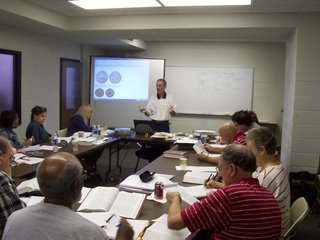
This past weekend, David May of Central Seminary was in Murfreesboro to teach the first session of the introductory New Testament course. There were 14 students present, three of those "lifelong learners" who are taking the course for their own personal enrichment. This brings the number of students at the Murfreesboro site of "the teaching church seminary" to 12 degree-seeking students and three lifelong learners.
This was seminary education at its best. Dr. May is an excellent teacher, and his interaction with the students was positive and helpful. The students came with high expectations and those were fulfilled. For three hours on Friday night and 10 on Saturday, they were challenged to learn more about the New Testament, its people, its setting, and its implications for our time.
Although much education can be accomplished online (especially with those who are digitally savvy), there is no replacement for face to face, personal interaction. I am pleased that the Central seminary program offers this as the major part of its Master of Divinity studies. Students need to interact with God-called women and men who love the Bible so much that they have committed their lives to its study. Faculty members need to get to know students who are making sacrifices to pursue their education in preparation for ministry. Quite fankly, I think "church happened" around those tables this past weekend.
Comments